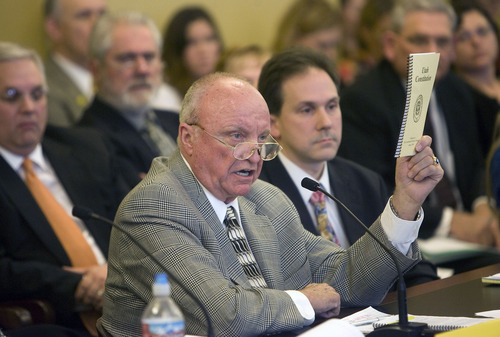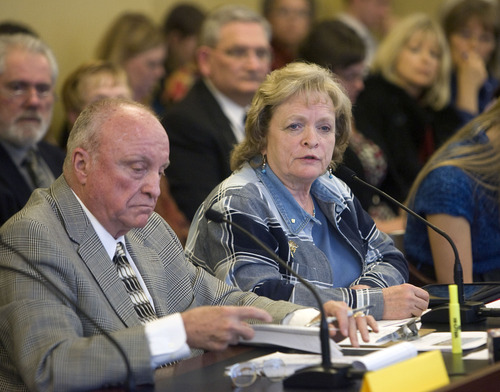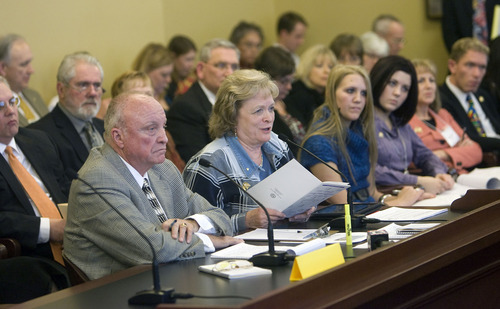This is an archived article that was published on sltrib.com in 2011, and information in the article may be outdated. It is provided only for personal research purposes and may not be reprinted.
Lawmakers advanced two resolutions Wednesday that could change who controls education in Utah after hearing complaints that schools and education leaders are violating state law by advocating for contraception, socialism and other values contrary to those of the state.
Those who opposed advancing the resolutions said schools should remain locally controlled, and shifting that control could slow innovation.
The first resolution, SJR1, sponsored by Sen. Chris Buttars, R-West Jordan, proposes amending the state constitution to place the State Board of Education's control over education under statutory authority. Buttars said the amendment would allow the Legislature to override the state school board and "set clear checks and balances for the department of education."
SJR9, sponsored by Sen. Stuart Reid, R-Ogden, seeks to amend the state constitution to give the governor control over public education and the state's higher education system. Reid said if his amendment passed the governor could still choose to keep the state school board and State Board of Regents, which would work under the governor's authority.
In order to take effect, both resolutions would first have to pass the House and Senate by a two-thirds majority. The questions would then have to be put to voters in the next general election.
The state school board now consists of 15 members elected to represent different regions of the state. The board supervises state education and makes rules to guide districts and programs.
Buttars said his amendment is needed to make sure local school boards are held accountable for following state law. He said "special interest groups," including those that advocate for "social justice have entered the system and become entrenched in some of our school districts."
"Today, social justice means that everything should be equal ... property, income, everything," Buttars said.
"Today we give billions of dollars to districts who refuse to conform to the demands of the state school board and do whatever they want with no accountability and no transparency," he said.
Several speakers at the Senate Education Committee's meeting then stepped forward to give examples of how they feel education leaders have failed to reflect constituents' values and broken state law.
Cherilyn Eagar, a former candidate for U.S. Senate, said the International Baccalaureate (IB) program is "replete with values and principles that are not representative of the state of Utah." IB students can earn college credit by taking rigorous courses that expose them to world perspectives in high school.
Gayle Ruzicka, president of the conservative Utah Eagle Forum, said sex education has gone too far in schools. A new State Office of Education slide-show presentation intended for sex education classes explains different types of contraception and shows photos and pictures of contraceptives, which is allowed under state law. Ruzicka, however, said she doesn't see how such descriptions and photos don't constitute advocacy of contraception in sex education, which is against state law.
Still, others said the Alpine School District hasn't been responsive enough to parents' concerns about math instruction and value statements that back up the district's mission statement, which some parents say inaccurately describes the U.S. government as a democracy instead of a republic.
Others, however, said they don't believe putting the state school board under statutory authority is necessary.
Peggy Jo Kennett, with the Utah School Boards Association and Jordan School Board, questioned why it's necessary to change the constitution because of disagreements largely in one school district. She also disagrees with the idea that special interests control local school boards.
"Local school boards are elected by the same people that elected, in Jordan School District ... Senator Buttars," Kennett said. "Local boards strive to be responsive to the state board, to the state constitution. We follow state law. We follow state curriculum and we strive to be accountable to our patrons."
Debra Roberts, state school board chairwoman, said in a statement read to the committee that the resolution would "limit what we could accomplish, limit the very innovations we are trying to forward."
"We believe the benefits that come from a strong elected entity far outweigh a change," Roberts said.
Sen. Karen Morgan, D-Cottonwood Heights, said it seemed to her the amendment would "turn the Legislature into a super school board and as such we would have to micromanage every little detail."
Meanwhile, Reid said his resolution, SJR9, aims to shift control of K-12 and higher education to the governor to create a "system that works in a coordinated fashion that provides the best education the state can offer." He said it doesn't make sense that the governor doesn't have direct authority over a system that consumes billions of dollars.
"What we'll have at the State of the State speech tonight is the governor will stand up and talk about education goals he will advance, but the truth is he has no authority to advance them," Reid said.
Committee Chairman Sen. Howard Stephenson, R-Draper, said he prefers Reid's bill to Buttars', saying, "The governor is where the buck should stop with the executive branch agencies, and education should be no different."
Stephenson said both amendments could not appear on the ballot because they conflict with one another. Still, he and other committee members voted to forward both of them. "They should be decided by the full floor because they are so significant," Stephenson.
Ultimately, the committee voted 3-2 to advance Buttars' resolution and 4-1 to advance Reid's. The bills will now likely go to the Senate floor. —







